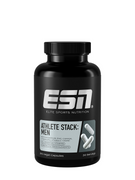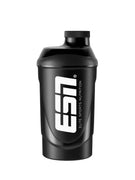Wenn du den Ramadan achtest, so ändert sich für dich einiges, denn von Sonnenaufgang bis Sonnenuntergang ist die Nahrungsaufnahme nach den Regeln des Koran verboten. Das Gleiche gilt im Übrigen auch für Sex, das Rauchen und die Flüssigkeitsaufnahme. Eine Ausnahme besteht in dieser Hinsicht lediglich für schwangere Frauen und kleine Kinder. Das bringt selbstverständlich einige praktische Probleme mit sich, denn zur Zeit des diesjährigen Ramadans geht die Sonne hierzulande bereits um ca. 4:45 Uhr auf und um ca. 21:40 Uhr unter.
Einer Fastenzeit von rund 17 Stunden stehen lediglich 7 Stunden gegenüber, in denen du Nährstoffe zuführen darfst. Die Fastenphase von etwa 17 Stunden entspricht allerdings auch dem Konzept des populären Intervallfastens – nur gilt es, die 7 Stunden Nahrungsaufnahme vom Tag auf die Nachtstunden zu verlegen.
Aufgrund der langen Fastenphase ist dein Körper ohnehin bereits einem großen physiologischen Stress aufgesetzt, sodass du Anstrengungen wie hartes Training über den Tag hinweg vermeiden solltest. Darüber hinaus ist auch die Nährstoffversorgung trotz der ergriffenen Maßnahmen, die wir dir im Folgenden noch erläutern werden, nicht die beste, sodass dein Körper mitunter auf seine Fett- und Proteinreserven zugreifen muss.
Es ist also wenig sinnvoll, das harte Muskelaufbauprogramm fortzuführen, da dies deinen Organismus über die Wochen hinweg nur zusätzlich auszehren würde. Trotzdem kannst du auch die Fastenzeit gewinnbringend nutzen: Du kannst eine Definitionsphase oder eine Reduktionsdiät durchführen. Unter dem Strich wirst du nämlich ausreichend damit zu tun haben, deine bereits aufgebaute Muskelmasse während des Ramadan zu erhalten.
Exakt auf dieses Ziel sind die folgenden Ernährungs- und Trainingstipps in unserem Ramadan-Fitness-Plan ausgerichtet.

Ernährung nach dem Fastenbrechen
Sobald die Sonne hinter dem Horizont verschwindet, sollte zunächst dafür gesorgt werden, dass der Organismus mit ausreichend Flüssigkeit versorgt wird. Nur so kann der Stoffwechsel auf Betriebstemperatur kommen, die für das Training und eine vernünftige Verdauung in jedem Fall notwendig ist. Rund ein Liter Wasser ist in dieser Hinsicht in der ersten Stunde nach dem Sonnenuntergang zu empfehlen. Um den Kreislauf zusätzlich zu pushen, lohnt sich auch eine Tasse Kaffee, Mokka oder Espresso mit ein wenig Zucker.
Da das Training offensichtlich nicht nachts um 2 Uhr beginnen soll, sondern bereits um 22 oder 23 Uhr, sollte unmittelbar nach dem Fastenbrechen nur eine kleine Mahlzeit mit 20 Prozent der gesamten Tageskalorien aufgenommen werden. Damit dem Körper während des Trainings genügend Energie zur Verfügung steht, bieten sich schnell verdauliche Kohlenhydrate und magere Proteinquellen an. Wer nicht auf einen Whey-Shake mit Maltodextrin zurückgreifen möchte, kann sich natürlich auch an Geflügel und (in Maßen) all den süßen Leckereien zu schaffen machen, die das Fastenbrechen im Familienkreis bereithält.
Post-Workout Nutrition
Unmittelbar nach dem Workout folgt eine große Mahlzeit, die rund 40 Prozent der täglichen Gesamtkalorienmenge umfasst. Es gelten prinzipiell dieselben Regeln wie außerhalb des Ramadan, sodass sich eine gute Post-Workout-Mahlzeit in jedem Fall aus hochwertigen Proteinquellen, Gemüse, gesunden Fetten sowie komplexen Kohlenhydraten aus Reis, Nudeln oder Kartoffeln zusammensetzen sollte. Süßigkeiten sind nach dem Training allerdings tabu, damit der Blutzuckerspiegel über die Nacht hinweg stabil bleibt. Wer mag, kann zudem auf Lebensmittel wie Hüttenkäse oder Magerquark setzen, die einen hohen Casein-Anteil haben und den Körper bis zum nächsten Morgen mit Proteinen versorgen, sodass die Regeneration effizient eingeleitet werden kann.
Ernährung vor Sonnenaufgang
Das Frühstück ist für die meisten Trainierenden ohnehin bereits die wichtigste Mahlzeit des Tages. Während des Ramadan sollte diese Regel jedoch besonders ernst genommen werden, denn nur wer genug frühstückt, übersteht die nächsten 17 Stunden ohne Heißhunger. Frühes Aufstehen ist angesagt, um rechtzeitig vor dem Sonnenaufgang abermals rund 40 Prozent der täglich benötigten Nahrungsmenge aufzunehmen. Da der Körper sehr lange mit den zur Verfügung stehenden Nährstoffen auskommen muss, ist es wichtig, auf Lebensmittel zu setzen, die langsam verdaut werden und lange satt halten. Bedeutend ist dies in erster Linie in Bezug auf die Proteinversorgung, denn ist der Aminosäurepool im Laufe des Tages erschöpft, vergreift sich der Körper an Muskeleiweißen. Wichtig sind also vor allem langsam verdauliche Proteine wie Casein. Auch hier kann wieder zum Klassiker Magerquark oder zu einem Casein-Shake gegriffen werden.
Sättigung und Magenverweildauer können durch einen gesteigerten Fettkonsum zusätzlich erhöht werden. Nutze dafür besonders hochwertige Fette wie Leinöl oder Walnussöl. Alternativ kannst du dir auch ein paar Eier zubereiten, deren Dotter neben wertvollen Fetten auch weitere essentielle Mikronährstoffe wie Vitamin D enthält. Abgerundet wird das Frühstück durch komplexe Kohlenhydrate wie Haferflocken oder Vollkornbrot, die ebenfalls eine sehr lange Halbwertszeit aufweisen. Bevor du aber in den Tag startest oder dich wieder ins Bett legst, solltest du abermals daran denken, ausreichend zu trinken, um für den Tag gerüstet zu sein.
Training nach dem Ramadan-Fitness-Plan
Wie bereits angesprochen, kann der Nahrungs- und Flüssigkeitsentzug während des Tages deine Leistungsfähigkeit einschränken, weshalb intensive Trainingsaktivitäten am Tag zu vermeiden sind. Das gilt sowohl für das Krafttraining als auch für Cardio-Einheiten, denn sowohl durch die fehlende Flüssigkeitszufuhr und die in der Regel warmen Außentemperaturen ist der Organismus ohnehin bereits in einem eher dehydrierten Zustand. Prinzipiell hast du aber zwei Optionen, wie du dein Training gestalten kannst. Entweder du trainierst, wie von uns empfohlen im Anschluss an einen Snack nach dem Fastenbrechen oder du gehst kurz vor dem Fastenbrechen ins Gym. Im letztgenannten Fall ist die Wahrscheinlichkeit allerdings hoch, dass deine Leistung extrem leidet, da du während dem Workout ebenfalls nichts trinken darfst.
Der Umfang des Trainings ist während des Ramadan ein weiterer entscheidender Knackpunkt, denn je mehr Trainingstage auf dem Programm stehen, desto öfter hast du tendenziell kurze Nächte mit nur rund 4 Stunden Schlaf vor dir. Ein 3er-, 4er- oder gar 5er-Split ist dementsprechend nicht gerade optimal für den Fastenmonat. Da es aber ohnehin vorrangig um den Muskelerhalt gehen soll, kannst du deinen Trainingsplan für diese Zeit auch auf einen 2er-Split mit vier Trainingstagen pro Woche oder auf ein Ganzkörpertraining mit nur drei Einheiten pro Woche umstellen.
Das reduzierte Volumen muss allerdings durch eine gewisse Intensität ausgeglichen werden. Diese Intensität erreichst du, indem du vor allem auf komplexe Grundübungen setzt. Du solltest darüber hinaus aber den Fehler vermeiden, absichtlich zu leicht zu trainieren, auch wenn es verlockend ist. Auf diese Weise reduziert sich nämlich unnötigerweise der Belastungsreiz, was sich negativ auf den Muskelerhalt auswirkt.
Abschließende Ratschläge
Achte insgesamt darauf, dass du ausreichend Protein zu dir nimmst. Gerade in dieser stoffwechseltechnisch stressigen Phase hilft viel tatsächlich viel. Rund 2 bis 2,5 Gramm Protein pro Kilogramm Körpergewicht und Tag sollten es schon sein, um den Aminosäurepool für die tägliche Fastenphase ausreichend gefüllt zu halten.
Da du dich nicht zuletzt bedingt durch den Nahrungsverzicht sowie durch die kurzen Nächte oft müde fühlen wirst, ist es wichtig, dass du dir tagsüber Auszeiten nimmst. Lege dich, falls es dir möglich ist, nach Feierabend kurz aufs Ohr oder halte zumindest einen Powernap in der Mittagspause, um insbesondere Energie für das Training zu tanken. Abschließend wünschen wir dir eine gehörige Portion mentale Stärke, aber wir sind sicher, dass du den Ramadan mit Hilfe unserer Tipps einer guten Form überstehen wirst. Zur Untermauerung dieser Aussagen findest du hier noch einige weiterführende Links zu anderen Artikeln und Studien, welche sich mit dem Thema Ramadan und Fitness beschäftigt haben.








